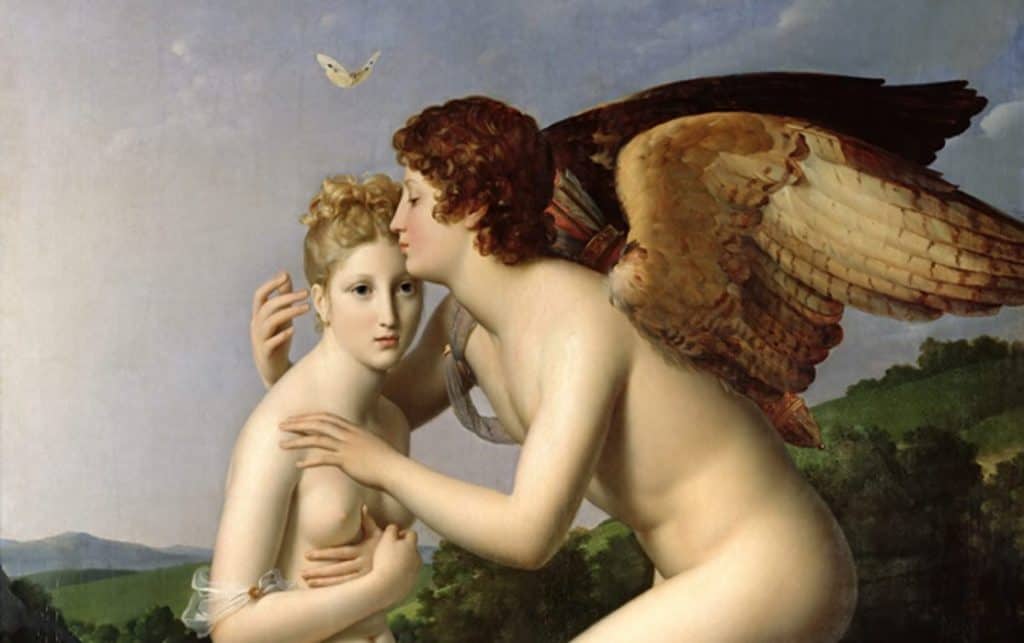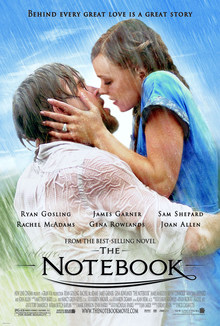“What is love?” is an often asked question. Yet, the meaning of love cannot be captured in a few simple sentences because the word ‘love’ does not have a single, fixed meaning. The sense or meaning of a word, especially that of love, is determined by its use in its language.
What is Love | Romantic Love | Erotic Love | Friendship | Arranged Love | Soulmate Love | Real Love | True Love | Other Kinds of Love | Love is Enigmatic |
Love, in the context of this site, is a passionate, erotic, and even ‘spiritual’ love by default, as in ‘being in love.’ This love is significantly more intimate than the rather impartial love of God and neighbor, called ‘agape’ or ‘caritas’ by luminaries such as the apostle Paul and Augustine, bishop of Hippo.

“The time for comprehending can be reduced to the instant of the glance, but this glance can include in its instant all the time needed for comprehending.”
Jacques Lacan
Poets and novelists intuit love as a most delightful experience of highly personal and deeply intimate relationships. Love breaks molds, begets new belongings, and makes life worth living. Even personal, intimate love is virtuous. Here’s more of what to know, more of what the meaning of love holds.
This is Us
Surely love — passionate and erotic as it always is — cannot arise between a man and a woman without desire for and attraction between each other. Love cannot be anything less than tender affection and attentive esteem for each other. The lovers resonate affirmatively and bestow heart and soul upon each other. Reciprocal and non-exploitative, love eventually kindles surrender due to enchantment and thus delight in each other, both in body and mind. So as to not leave one of them wanting or being replaceable.
Yes, that is a lot, more than what most folks can handle, more than what life really affords most of us.
Out of Reach, Missing Out, and even Forsaken
Does love happen all the time, always to its fullest, and everywhere to everyone? Nope. Just imagine what a young, single male living with his parents in a remote Alaskan village of 187 people has to figure to make love come true for him. What about a person who got traumatized growing up with a dysfunctional mom or dad? Can he or she ever trust anyone else but God? Or what about that single, middle-aged mother working as a street vendor in New Delhi, India? Can she worry about anything else than feeding herself and her kid?
Realistically, love seems to be out of reach, even unnecessary, or otherwise not feasible for a whole lot of folks on Planet Earth. Love and its delights are regularly dismissed, forgone, or forsaken as being too indulgent, unsafe, impractical, or inconsequential. Sadly, most people do not marry for love, they practically marry for the sake of sex, family, lineage, or money — hoping that a little love will follow.
Worse, it used to be that lovers knew they wanted to be together, like Romeo and Juliet, but couldn’t. Now it’s that singles can be together but aren’t sure they want to. Especially younger singles have still unclear views of themselves and their situations and do not understand what love is.
Yet, most everyone has love on their mind. And it is not just new belongings that people seek, but also the delights of passionate love — often rather secretly.
Love is deemed Capricious
There aren’t that many delights to be had while ‘being loved’ or ‘being cared for’ by either a mate or a deity. Such one-sided love induces shame after all. More delights are found in the undisturbed act of reciprocal and non-exploitative loving between a man and a woman. That is to say, ‘being in love’ with another in both mind and body is truly exhilarating!
Some folks, especially those afflicted with an overdose of nostalgia, may be unable to appreciate what they would call love’s capriciousness. They point to human love, not the sacred love of a divine being.

But even the love of a god can be capricious. Some members of new religious movements may remember once ‘dropping everything’ so as to join such a movement, much to the consternation of their parents (see Luke 14:26). What about Abraham just stopping short of murdering his son Isaak or the medieval Crusades killing thousands in the Middle East? No, God’s love is not necessarily any less capricious, risky, or unsafe than the most aspirational of erotic love.
Often, then, the commitments of sex and family dominate the center stage of life. Human love is viewed as a risky extravagance, even by people living in privileged circumstances, and kept under wraps.
The prevailing cases of men abusing dependent women do not help to install confidence in love, either. However, women know how to have it their way as well.
Profane or sacred, sacred or profane? The romantic and/or erotic beginnings of real love in lasting conjugal relationships deserve to be recognized with respect instead of mere suspicion. Before love is capricious, it really is spontaneous. Like kids, love surely isn’t boring.
No Pains, no Gains
In a large, modern society people will differ as to which expression of love they seek: that of passion, desire, and risk, or that of respect, constancy, and commitment — or something in between.
A love surely can be short-lived. Some folks, man and woman, go intentionally only for the cherry on the cake and then move on from each other. That is not us.
After having perhaps survived bouts of romantic love during teenage years, some folks then seek stable, long-time relationships and understand that real love relationships are not to be taken for granted. That does not sound very romantic, but life –they say — is such that there appears to be no ‘gain without pain,’ even for the most optimistic.
Finding the right mate then amounts for the cautious — for many — to settle for a good-enough Mr. Right or a good-enough Ms. Perfect with whom it is probable to ‘double the gain by halving the pain,’ and as long as there is some chemistry between the two.
The few more daring, however, try to find the elusive One within whom to delight, as well as with whom the journey of life promises to be delightful. That is, regardless of gains or pains, the daring will hold out to marry for that one-of-a-kind love. And some get lucky!
Pragmatic or not, gazillions of couples out there in the world are fairly happy –always have been, always will be — no matter their race, ethnicity, country, or religion. People, after all, are adaptable.
Revealing Itself

Love is not the same as liking or benevolence or sexual desire. Even love and loving are distinct notions, with the former being a phenomenon, a felt or lived experience that actually is hard to describe in words, and the latter describable as an attitude leading to actions benefitting the beloved.
Love does not necessarily reveal itself by virtue of a fancy diamond ring or elaborate marriage ceremony. Rather, look for the almost trivial and yet delicate and imponderable glances, gestures, tones in their minute timings. Of many vanilla ‘things’ being equal — as in biceps and bosoms — what people probably find so charming about the other, so loveable, are his or her many nuanced demeanors perceptible only on close-up. When in love, these demeanors trace even more saliently.
There is that twinkle of the eye, the pitch of laughter when caught off-guard. What about the rush of emotions when being touched accidentally? Or the resolve or lack thereof regarding much about nothing, in private? All of it and then some making him or her so unique, so charming, and so endearing.
These nuanced demeanors might tell of the presence of affection and even love, but they do not tell much about the strength or depth of love if any. It is true that love disarms our emotional defenses. One must ask if these demeanors are indicative of only infrequent and faint instances of affection, dismissible without second thoughts? Or are they indicative of a possibly strengthening attachment that involves the interweaving of deepest hopes, wishes, and values? Would even an observer wonder if it could be love, a love that the observer could be secretly dreaming about him or herself?
Yes, one has to look for changes in specific demeanors and behaviors and even minute physiological changes in one’s and the other’s body to assess if it is not just liking or desire but real enthusiasm or — God forbid — love. Actions speak louder than words, they say, but the devil is always in the details.
Modern courtship might help singles to better evaluate and appraise themselves, the other, and their situation. People need to know what it is that ‘fires them up,’ if so. Are they in love with being in love, with something about the beloved, or with the actual beloved as he or she is? What is the depth of that sympathy, can it be called love? In most failed relationships, singles did not commit based on cheesy intentions, but on honest mistakes in the appraisal of their situation.
In the end, love is an antidote to isolation as well as social engineering. That is to say that promoters of caste systems, as well as monarchic and aristocratic lineages, are fearful of love. While arranged marriages are still a norm in even present-day cultures, there can never be such a thing as arranged love.
Liking, the Precursor to Love
I would think so. I cannot imagine two people continuing to date or court each other without actually coming also, if not first, to like each other. In the absence of liking, any dating or courting is suspicious to me. What might they be after if not at least liking? There sure are justifications for dating and courting that discount genuine liking: money, sex, prestige, lineage, and related parental interests come to mind. Perhaps it is hoped that love comes along later, eventually, by chance, by effort, by some sort of miracle, and/or by the invisible hand of God. True, it is not unheard of.
But will or can these sorts of circumstances ever be truly appealing to most ordinary folks? To fringe people perhaps, those looking to bond in marriage for ulterior reasons but human love.
Permission to Love
What might come after an initial ‘liking of each other’ that perhaps allows for love to develop? Sort of short of ‘falling in love?’ Most literature about the nature of love, and there is plenty to read, misses an important aspect of the natural process of two people coming to love each other. That aspect is that of permission.
It is said that two people ‘being in love’ cannot see each other’s faults anymore − at least for as long as they are in love. Everything cannot be anything but good between the two − and that situation is beyond the control or choice of any one of the two. That is what ‘being in love’ is also about for lovers. What underlies this condition?
It was not until I recently read up again on Transactional Analysis (TA), a form of modern psychology, that I realized the persistence of permissions in our daily lives. Transactions refer to the communication exchanges between people. TA examines a person’s relationships and interactions in order to facilitate growth and prosocial change in clients by helping them develop better self-awareness, communication skills, understanding how people give and receive positive and negative stroking, and changing unhealthy patterns of stroking.
Permissions are needed for about just anything deeper in human relationships than casual greetings. Sure, I am free to wave at you lounging in your front yard when passing by your house. But when two people come to like each other and consider furthering or deepening the relationship towards a social bond of sorts, they will need to exchange each other’s permission to do so − overtly or covertly, consciously or unconsciously, spoken or unspoken. Without some implied permissions, one or both will be trespassing on the psyche of the other.
Some people will call that ‘letting the guards down.’ Others call it ‘allowing for emotional vulnerability.’ Whatever…
‘Being in love’ then is when most all permissions are given and received between the two. Continuous ‘being in love’ is when additional permissions regarding intimacy are seemingly guaranteed between the two.
It is when final permissions are not forthcoming or withdrawn that the relationship will suffer to the point of a likely breakup.
So, should one marry someone without having received the most essential permissions from him or her, or without being willing to give the most essential permissions − whatever they might be? Can human love develop without the most essential permissions being given and received? Without clarity, the two can hardly be said to be on the same page going forward.
Virtues and Vices
In the end, we admire but do not love another for his or her virtues, and we cannot come to love another without being privy to his or her vices − if ever so few. In love, we do not have to play a role − although we can; we do not have to put on a show − although we can. In love, each one reveals him or herself as he or she is.
While being in love, each one not only wishes to share a bed with the beloved, but also cares for the other more than for him or herself − perhaps for the first time in life. In a life weighed down by duties and obligations, by moral and social bookkeeping, passionate love then is that shared oasis of no duties, no obligations, no personal bookkeeping, no hidden agendas, no propaganda. Each lover simply bestows value on the other. Daring as it may seem, passionate love is virtuosity par excellence.
In the now-famous love letters between Héloïse and Abélard, she speaks of love as ‘true tenderness.’
The few words of a text like these musings cannot aptly describe the love that people are secretly longing for. Nothing can substitute for the actual experience of love, not the reading of cheap romance novels or the secret viewing of erotic videos.
Secret Sauce of Life and other Perspectives on Love
What Matters in Love
What matters to people most, however, is perhaps how they actually experience love in life, that is, not only in a moment. There are delights to be had in any kind of love, even in unrequited love. In the end, people do not care so much about where love comes from or what love is, but simply what love promises.
How do we ‘fall in love?’ What is it to ‘be in love?’ What will love do to lovers and others? What do lovers do to one another and others? And can love be lost, can love be rejuvenated? How can love last, and even if it lasts, will it be the same over time?
Passionate love is very personal, and that is also why love is not a child’s play. Even, though, children may grow up dismayed when attention to great sex or religious duties far outweigh any affective, tender love between mom and dad. Marriage isn’t the real issue, it is love — or its absence.
Love Unfolds and Folds

And while love endures its eternal repetitions, it does so not without transforming in ever-changing phases, gradations, and stages, of various qualities, quantities, relations, and modalities. Possibly transiting from romantic love to real love to true love, from a passing inclination to a vehement passion to friendship, from being passionate to being compassionate, love cannot be arrested. Over time, love cannot be the same, it cannot remain identical. ‘Being in love’ — unwillable and uncalculatable — is unlikely to last, but ‘loving’ can.
One must recognize that what people want and do in their 50s, 60s, and beyond is often very different from what they wanted and had done in their 30s and 40s, let alone their 20s.
Romantic love alone can come about at least twofold. People may fall in love via the passion of infatuation — the unexamined, visceral overvaluation of the other, and people may enter love via the passion of thoughtful appraisal — and bestow love in gradual surrender to the enchantment of the other. And even an infatuated love may eventually find its footing in this world. We’ll grant the opposite point of view to the perpetual nay-sayers.
So, love manifests as hot or erotic, warm or friendly, even cold or empty. Over time, the ‘color’ of love will change as erotic love can hardly be the same for young and mature.
Other than that, love is experienced not only in a brief moment — like that of perhaps falling in love. Love is also experienced as a temporary episode — like that of then being in love. And love can be experienced over a life-long affair between two mates — like that of a noble friendship. That is, love will transition from being ecstatic to be rather pragmatic. It is just a matter of time as a state of ecstasy, being extraordinary, cannot be other than temporary.
Why does ecstatic love, that of falling in love and then being in love, not last that long all by itself. That is so because people and life — and not necessarily love — are too vulnerable and unpredictable, respectively. Life wears on people, including lovers. Love, instead of being the source of trouble, may actually help smooth out some of the inevitable potholes on the path of life.
And then again, some lovers intentionally break up because they realize that the relationship and their well-being aren’t going anywhere in spite of their love for each other. Is it love’s fault?
During sometimes rapid times of when loving relationships transition from their early days or years from being ecstatic or aesthetic to be more pragmatic or ethical, mates do wonder, if not also worry. ‘Are we losing our love?’ ‘Do we not need to keep caring for the children?’ It is during that stage of their relationship that mates need to go steady, and not resign and lose sight of love as a living reflection of their own lives.
Pop culture dwells on the relationship failures of its stars. This romance, that breakup, and everyone says “Oh, so sad.” Stardom just isn’t about real lasting love. Many Hollywood movies end when the two actors finally, and against all odds, confess their love and drive off either into the sunset or over the cliff. But luckily there is more to the story of love.
Love takes Time to Strengthen
Real love may have its beginnings as a romantic and/or erotic affair. Perhaps love kindles after years of only friendship between two, or only after an arranged marriage managed to bear fruits (kids). Who is to tell?
A really puzzling phenomenon is that many singles profess to be clear about what it is that they are looking for in a mate. Yet, they readily fall in love with someone who is quite different from that image. Surprise!

In any case, love takes a bit of time to develop as the two partners jointly engage in “deep improvisation” whereby they are working out of their values and identities through the process of living together and aligning their interests. The two lovers, however, seem to never be able to merge into just one whole, other than in that minute erotic climax. Ever so close, the remaining microns between them can sometimes seem to be as frightening as an abyss.
For younger folks, love might start as a vital, passionate affair as they may look forward to falling in love and to being in love. ‘How can love be wrong when it feels so good?’ True, but that feeling is not going to last as it is likely an overvaluation of their moment, turning them into ‘infatuated’ lovers.
Renown psychologist Erich Fromm tells us that ‘most people see the problem of love primarily as that of being loved, rather than that of loving, of one’s capacity to love.’ He encourages people to work on their character and skills to love.
And that is a matter of attention. Metaphorically speaking, people say that we should ‘open our hearts,’ that we should ‘grow our hearts.’ More to the point, ‘capacity to love’ starts as a matter of availing due attention to love, to the other, that is, never taking love and the other for granted.
Love can last if honored and nurtured! Some understand that reciprocal enchantment of the mate is not a one-time task to just getting into marriage, but an indispensable act worthy for eternal repetition. Yet, others may rather defer their joined, inner lives to be illuminated by the curated love of a god or their eventual children. Real love, then, is also cherished for its constancy.
Even though, any passions for each other may ratchet down from love to sympathy, empathy, or compassion. With increasing age, people are likely to lose a bit of that delicious ‘tenderness of youth,’ and love cannot help losing some of its steam. Trying to find love in old age is no theme of interest for Hollywood.
Between falling in love and falling out of love, or love having no end in sight or love just slowly petering out, or love being medicated by a deity or love being treasured over distances, love can be superfluous and is perishable. Yet it has endured the follies and frailties of ever-changing epochs.
The Relationship needs Nourishing as well
Recognized as distinct also needs to be the relationship between the two lovers, that is, apart from the two lovers and love itself. ‘Being in love’ may prompt each lover to care for the well-being of the other, implicitly also the self, but there is also a notion such as ‘love is in the air.’ ‘In love,’ the relationship has a transpersonal quality to it, and that is often called love.
The object of care then must not just be the other and/or the self, and it cannot be love as love is beyond volitional care; it must be the relationship itself. The feelings ‘we’ share, the beliefs ‘we’ share, the behaviors ‘we’ display, the commitments ‘we’ hold, are all notions that must be on each lovers’ mind.
Well-lived Lives
Attempts for love are bound to fail, said psychologist Erich From, unless lovers try most actively to develop their total personality, so as to achieve a productive orientation. The attainment of the capacity to love remains a rare achievement.

But yes, flatlined love is not the end, it can be rejuvenated if there is still some desire left. If one or both are willing to abandon cold routines and other causes of contempt. Yet, many folks rather watch TV on end before seeking a marriage counselor.
When passionate love seems to have perished to a point of no return, the couple may try to acknowledge and honor their relationship, without pretense, as a friendship — a much less volatile kind of love. Companionate friends do not necessarily ‘in love’ anymore, but they may still desire one another: they still manage to accommodate each other, they still talk to and affirm each other. When all desire has gone and antipathy begins to take over, though, it is perhaps better to call it a day.
No, one cannot step into the same river twice, but one can always step into the river again.
As such, lasting love and happiness is not so much a thing two people aim at, but a by-product of well-lived lives together. Arguably, well-lived lives and their loves do not settle on habit or routine, on the prescribed, the meticulously organized, or the publicly intentioned. And that is what makes well-lived lives so exceptional.
Interests regarding Love
But as English philosopher John Stuart Mill already said, ‘people are just like plants, they differ greatly in the conditions needed for their flourishing.’
One might say that love isn’t the same for a man and a woman. It may be so that men and women have diverging interests regarding sex and family, and that makes the ‘feeling’ of love different for people. Some interests are often in sync — like interests in kids and family, others perhaps not always — like interests in sex. Sadly, women have said that men cannot love, and men — to that point — have said that women are useful.
Philosopher of antiquity St. Augustine already insisted that even loving acts, being good and impressive at face value, can be motivated either by a good or a bad intention, by right or perverse love, by charity or pride.
So as to avoid these unpleasantries from potential conflict, lots of single people — including men — are looking for a ‘soulmate,’ that is a soulmate love or relationship. In such a relationship, both mates deeply value or ‘love’ a shared common ground first, before each other — that is before they must eventually face each other as well. That common ground often is a religion, with its prescribed beliefs and conducts. A lesser ground may be a shared affinity for a hobby or even a shared aversion to certain attitudes.
Is a Lover Good?
Surely, love cannot be justified by claiming that it simply makes a man or woman an outright ‘good’ person, as that is not the case. Love, according to philosopher Friedrich Nietzsche, transcends any classifications of morality.
This postulation is subtle and must be taken with a grain of salt. All sayings about love presuppose an often-unnoticed distinction between ‘love’ as a noun, ‘loving’ as a verb, and ‘being in love’ as a state of the psyche.
It isn’t that love automatically makes a person good. Far from it. Love, in the context of a noun, can mislead just as well as any bias and has turned many a lover into a fool (Don Quixote, etc.) and even worse. It is the act of loving, in the context of a verb, that will — over time — esteem even the fool.
Ancient philosopher Aristotle already knew that temperant people will discover the ‘mean’ between excess and deficit in the satisfaction of appetite, avoiding both gluttony and starvation. It seems that for a man or woman to be good, including when in love, requires a bit of self-mastery.
In Recognition of Love
In his essay In Praise of Love, French philosopher Alain Badiou makes the case for ‘love being an answer to loneliness.’ Love, then, creates unpredictably new belongings and a lasting interdependency between the two. Love changes the outlook on life for the lovers as it is a most potent antidote to the self-interest that dominates the modern world. Badiou argues that love is our greatest hope for bridging the gaping divide between self and other. In Badiou’s narrative, love is characterized as a lasting construct of human faculty and not an essentially fixed ‘thing’ in ourselves.
In her anthology On Lies, Secrets, and Silence: Selected Prose 1966-1978, poet and feminist Adrienne Rich reflects deeply on love:
It is important to do this because it breaks down human self-delusion and isolation.
It is important to do this because in doing so we do justice to our own complexity.
It is important to do this because we can count on so few people to go that hard way with us.
In his enlightening book On Love, Spanish essayist Jose Ortega y Gasset points out that ‘what exists in love is surrender due to enchantment.’ Love itself charms or beckons for the involuntary surrender of the beloved. Being in love, then, is one of love’s ultimate achievements: the surrender of an innermost realm of psyche due to enchantment. That is not to be mistaken as submission prompted by moral duties or customs. Passionate lovers will say that they freely resonate with each other. Gasset’s narrative characterizes love as a movement and not an essentially fixed ‘thing’ in ourselves, either. One might say that as a movement, love engulfs the two, while also being engulfed by the lovers themselves.
We always Appraise and rarely Bestow
Academics like Irving Singer and Leo Buscaglia promoted the idea that love really involves the bestowal of value upon the beloved. As social beings, we all are in the business of constantly appraising each other, and without that purposiveness, we would not, we could not function well as a community. The caritas or agape kinds of love are deliberate, say many, sort of impersonal efforts characterizable by some indiffenrence. Passionate, erotic love, however, is not only informed by an appraisal, it is not that practical after all or even impartial, as it privileges — more involuntarily than not — one above another for no apparent reasons.
Love, in its defense then, creates new values in the act of its bestowal upon the beloved. The beloved comes to be valuable to the lover as a result of the lover loving the beloved. In love, the beloved is not replaceable.
The Pros and Cons of Exclusiveness

Love, as ‘free from’ shame, as ‘free to’ surrender, as the emotional helplessness of ‘being smitten,’ generates a natural exclusiveness in a resonating relationship. That is because — let’s face it — one surrenders to another as deeply and delightfully as love is allowed to uproot one’s psyche. Can one really desire or be in passionate love with two or three others to the same degree, at the same time? There, then, is only the ‘One.’
In the case of benevolent or charitable love, this ‘agape’-kind of love often substitutes to some extend for passionate love between two people of faith. However, agape love is not necessarily exclusive by itself. On the contrary, agape is rather a many-to-many love and not a one-to-one love. In agape love, it is the formal marriage contract that then binds two people in marriage — besides their faith, and less ‘that visceral’ love for each other.
While being in love, or even when only loving more out of passion than of equitable consideration, there emerges a kind of partiality towards the beloved. This partiality is sometimes suspected by people of faith who prefer the impersonal agape love to underly their relationships. That some loves involve partiality, however, is itself morally valuable because it supports loving relationships that contribute ‘to human well-being, integrity, and fulfillment in life,’ unmatched by any other kinds of love.
This is because, Solomon suggests, in loving someone, a person wants to be better him or herself so as to be worthy of the partner’s love.
Envy – an Enemy of Love
Unfortunately, from the outside, from the point of view of an eager rival, such a delightful love may be looked at with envy and then some. Whatever one possesses, another will seek and a nasty rivalry may break out. And from the inside, such love is then protected with jealousy and marriage.
Yet, there is also the issue that an exclusive relationship between two lovers makes others feel simply excluded; again more so if that loving relationship seems to afford the lovers some natural bliss. Envy then may also select to rather conspire with others to morally shame natural bliss so as to lessen their pain from exclusion. Could it be true that it soothes people’s minds to know that others now suffer at least as much as them?
This speaks to the conception of ‘love being unsafe‘ and brought us Romans 13:9.
But it is not love that is unsafe, it’s more likely that people are unsafe. Love is just an easy scapegoat. And yes, gated communities of, for, and by the like-minded seem to make life a bit safer — for those behind the physical or mental fence.
At Stake is the Future of Love
It seems to be the case that social and cultural factors likely play a greater role in shaping human sexuality than mere biology. Within that open domain of relationships, many folks fancy constellations of loving relationships other than that between one man and one woman. How a person will conduct his or her passionate love life depends a lot on what one thinks love is, and what kind of relationship one is after.
Love, after all, is not an absolute but a human construct that is somewhat dependent on time, place, and culture. However, the fact that humans only know of two biological sexes, male and female, anchors and defends our conception of love as that between a man and a woman.
It appears that there is, around the world, a turn toward passion being more positively regarded and yearned for more intensely than ever before. Even in Asian cultures, generally understood to be more collectivist than individualistic, love now begins to assert its distinctiveness in line with commitments to sex, family, and lineage.
In a slow shift, the arranged marriages of the past are being replaced by relationships between evermore autonomous singles, freer than ever to choose their mate as they wish. That is, fewer people are willing to marry someone whom they do not love.
Obviously, with that freedom of choice comes the possible anguish inherent in making choices and then owning them. All that bears on our past, current, and future understanding of love.
Were They Mindful Enough

Tom Björklund, via Wikimedia Commons
Neanderthals and Denisovans were probably tender enough to ‘make affectionate love’ when ‘nature called,’ but were they already mindful enough to ‘make love’ out of ‘being in love?’ That is, not just out of a rut but out of being fascinated by and realizing pure delight in the other’s mind and body? Would they already have had a conscious inkling of an unusual emotion, that which what one day would be considered ‘being in love’ — that is, something wondrous rather than mere instinctual liking motivated by physical arousal? We now know that Neanderthals and Denisovans mated with modern humans.
Anthropologist Claude Lévi-Strauss argued that the ‘savage’ mind had the same structures as the ‘civilized’ mind and that human characteristics are the same everywhere. That’s great, I am ~3% Neanderthal. But did Neanderthals and Denisovans already knew love, did they recognize love? As social beings, they must have cared about a lot of things, including each other, but did they already care about love? Would they have said words, more or less helplessly, so as to mean ‘I love you’?
What about Adam and Eve?
Isn’t it strange that after thousands of years of religious authorities telling us with great certainty what to believe about all kinds of things, they are silent on further detailing to make intelligible the immensely consequential story of Adam and Eve and the Fall of Man?
Passionate human love is still a kind of a rebel in a world organized as patriarchy — with men trying to possess women. Passionate love, reciprocal and non-exploitative between a gentleman and a lady, can always make the world go ’round!
Live to Love, or Love to Live?

We all have come to think of it: ‘live to work, or work to live?’ Obviously, we work to live, even though it does not always feel that way. 9to5 work is a means to an end, which is life. What about love and life?
It is said that ‘love makes life worth living.’ And that ‘love is life. And if you miss love, you miss life.’ Isn’t all that just a bunch of hype? Perhaps.
That love makes life worth living is a compelling belief, though. Love is an end in itself, one might think, because what else could make life worth living? But it does not imply that we simply must live to love — as if in servitude to our erotic passions or moral and social duties. Love is also a means to an end, that of good living for each of us.
We can be happy campers in this world without ever having fallen in love, without ever having been in love! Nice as these passionate, irrational loves are if ever experienced and then remembered during the senior years of life, love is found to be a lot more pervasive in people’s lives than just in these two occurrences.
There is plenty of love that does go around, plenty of good-enough love — as in when we are loving others and being loved by others in an intentional manner — with purpose in mind and all without having fallen in love or being in love. It’s just when there is really not enough love of any kind in life, or when love goes terribly wrong, that we must despair.
Love is what makes the world go ’round. It will nip you in the butt when being mistaken about that.
